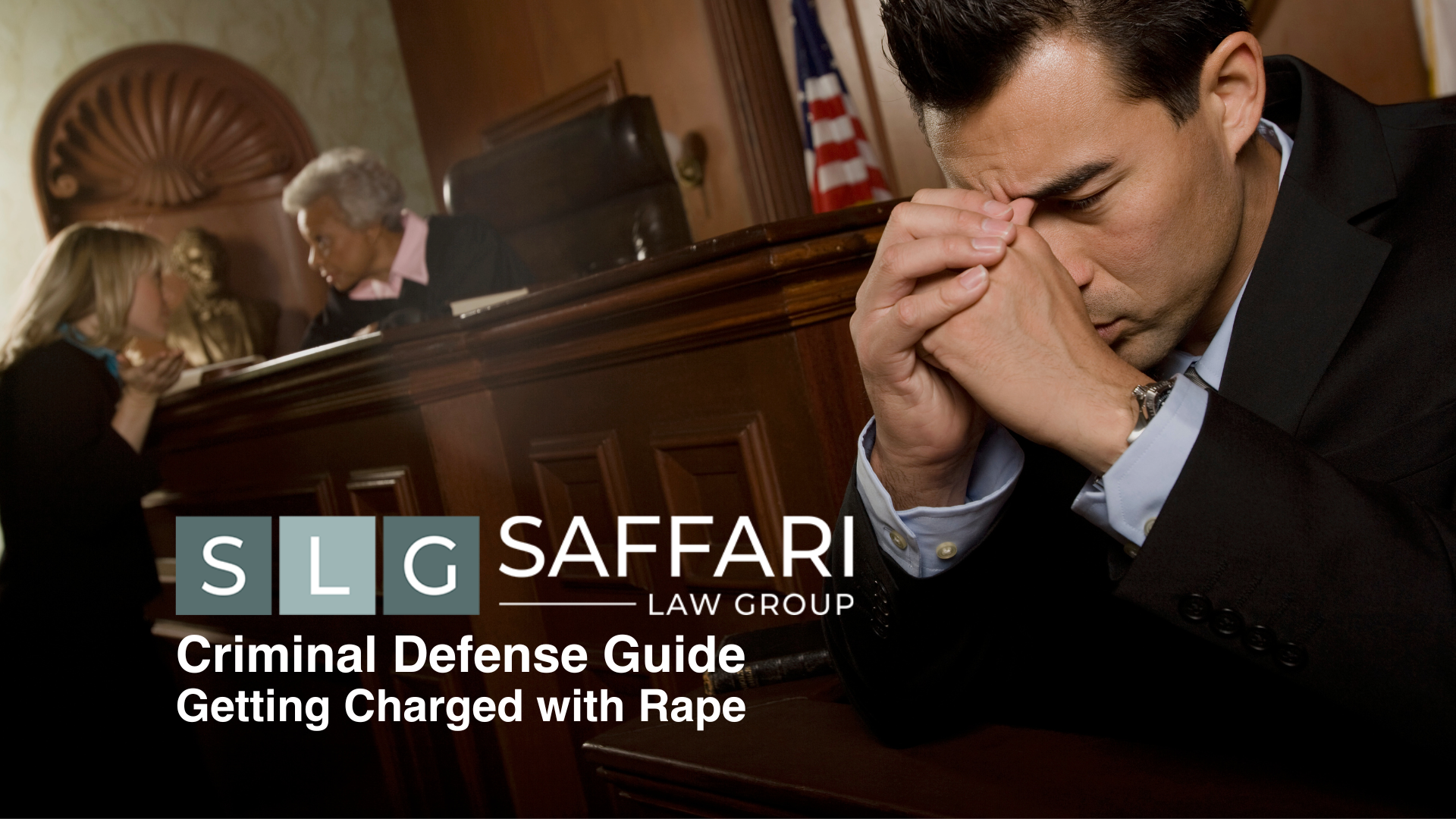
Table of Contents
What is Rape in California?
When you get charged with rape, it can carry some of the most severe penalties under California law. Despite the severity of the accusation, and the stigma surrounding it, the possible outcomes– whether it be considered a misdemeanor or felony, for instance– might appear enigmatic. For this reason, it is always strongly recommended to involve a lawyer as soon as you can, at any stage of the accusation.
Under California law, rape refers to the act of non-consensual sexual intercourse. For a sexual act to be considered rape, one or more individuals involved have not consented to such action or are incapable of consenting. To clarify, California law stipulates that to meet the requirements of consent, each party must act freely and voluntarily and know the nature of the act.
What Constitutes As Rape?
One or more of these requirements being impeded constitutes rape. If a rape allegation should reach trial, a judge will scrutinize the circumstances to ascertain whether or not consent existed. A sexual partner does not need to resist communicating that they have not consented to physically. In many instances of rape, an individual may be forcibly coerced into sexual intercourse through means that are not necessarily overtly violent; the victim does not have to be in imminent danger for a situation to be considered rape.
The very threat of bodily harm, extortion, blackmail, or leveraging any power over an individual, real or perceived, is enough to substantiate a rape charge. That said, different kinds of coercion tactics on the part of the alleged offender bear different arrays of specific rape charges. The type of rape charges brought forth rely greatly on the context surrounding the alleged incident.
For instance, the alleged offender could have maneuvered their victim into a vulnerable state through drugs or alcohol, or they could have chosen their victim due to a perceived vulnerability such as a mental disability, rendering the victim incapable of expressing their sexual autonomy.
Non-Violent Rape
Whatever the media might portray, rape rarely occurs in a secluded, dark alley, being perpetrated by a stranger. More often than not, the alleged offender is a spouse, friend, co-worker, or some peer or close confidant. With these types of more intimate relationships come different situations and complexities surrounding an alleged rape.
Date Rape
Date rape, for instance, usually refers to a context in which one party is sexually coerced through drugs or alcohol in that kind of “date-like setting.” While ‘date rape’ is not a legal term and is treated the same as a standard rape charge, it does fall under California’s “diminished capacity” clause, which expresses that rape occurs when an individual is in a compromised state, thus making consent impossible.
Diminished Rape
Diminished capacity rape involves the forcible sexual penetration of an individual who is unable to provide consent due to physical reasons, intellectual capacity, or intoxication. Rape is constituted by the sexual penetration of a person who is asleep or unconscious, regardless of prior consent. It is crucial to note that even if consent was given or implied before, the victim must be cognizant and capable of understanding the situation, with the ability to revoke consent if they so choose. If you are facing legal issues related to forcible sexual penetration, consulting with a qualified forcible sexual penetration lawyer in Los Angeles is essential for proper guidance and representation.
Rape, through fraud, trickery, or artifice, robs the victim of their full understanding of the situation and their ability to make a reasoned & informed judgment. Therefore the victim lacks the full ability to consent.
Rape by Fraud
We usually think of rape as being done through means of threat or force. Deceit, therefore, is a lesser thought means when it comes to this type of sex crime. Misrepresentation of identity to attain sex is rape and will be treated in the same manner as rape through threat or force. Despite being less talked about, rape by fraud has expanded its definition in California.
Impersonating Someone Else
Before 2013, for instance, fraud was limited to acts of penetration under the belief that the perpetrator was, in fact, the victim’s spouse. Since the ruling of the People vs. Morales, this type of sex crime broadened its definition to mean that impersonate any person, not just a person’s legal spouse, constituted rape by fraud.
Rape by Fraud Charges
Rape by fraud carries with it similar penalties as the aforementioned rape charge, including a sex offender registration, 3, 5, or 8 years in prison, and up to $10,000 in fine. Several legal requirements must be proven in court to prove that the defendant used fraudulent means against their victim– these include a misrepresentation of a material fact, a knowing intent to defraud, and a reliance on such misinformation.
Again, each person must have a full understanding and awareness of the situation to consent, which is impossible to attain in a fraudulent situation.
Spousal Rape
As recently as October 2021, California repealed its ‘spousal rape’ law, which once differentiated the legal logistics of rape between legal partners. ‘Spousal rape,’ which fell under Penal Code 262, was punishable by three, six, or eight years in a California state prison and a fine exceeding no more than $10,000. Ultimately, the punishment for ‘spousal rape’ was less than what fell under the charges defined by Penal Code 261– the code which outlines the punishment for rape.
The law differentiating ‘rape’ and ‘spousal rape’ seemed antiquated; advocates for the repeal cited that rape in the context of marriage should not be treated any differently than rape without a marriage license between the two parties. Advocates of the repeal also assert that the law, as it reads now, reflects a more modern attitude toward marriage and partnership.
Changes in Spousal Rape Laws
What is arguably one of the biggest changes in the law is that now those convicted of raping their spouse must undergo the same sex offender registration as outlined by penal code 261. Additionally, those convicted of raping their spouse under the law as it was previously written could often rely on said law giving them maneuverability to attain a favorable plea bargain; spousal rape, unlike other rape laws, did not require a mandatory minimum in sentencing, and defendants could rely on more probationary sentences instead.
As previously written, the law also essentially forged much of those ‘diminished capacity’ clauses that informed many rape cases: inability to give consent due to being unconscious or under the influence did not exist under the spousal rape law.
At the end of the day, if you have found yourself charged or under investigation for raping your spouse, California law will treat the situation as a full-fledged felony rape case. Especially considering the new revision of the law in California, you must find the best attorney to represent you in criminal cases related to rape.
Statutory Rape
We had previously mentioned that to attain consent, both parties must act freely, voluntarily, and fully understand the situation. California law understands and stipulates that when it comes to minors, who have yet to be fully cognitively developed, those three requisites cannot possibly be achieved. By establishing a set age of consent, the law acknowledges a point in maturity at which someone can make legitimate, informed decisions about their sexual expression.
Even when consent appears to have been given, sex with an individual under 18 is typically penalized under California’s ‘statutory rape’ laws. California law also stipulates that it does not matter if the sexual act was initiated by the minor in question. Again, the appearance of consent is not a viable defense in California. Statutory rape is classified as a ‘wobbler’ offense, providing the option to charge it as either a felony or misdemeanor. If you find yourself entangled in legal matters related to statutory rape, seeking advice and representation from an experienced statutory rape lawyer in Los Angeles is crucial for navigating the complexities of such cases.
Conviction of Statutory Rape in California
The primary indicator of how the case will be treated, be it a felony or misdemeanor, is typically determined by the difference in age between the two parties. If the defendant is no more than three years older than the victim, the case could be treated as a misdemeanor, carrying a penalty of one year in county jail, a fine of up to one thousand dollars, and summary probation will be levied upon conviction.
If, however, the victim is under the age of 16 or the alleged offender is over the age of 21, the resulting penalty upon conviction could result in up to four years in state prison, a fine up to $25,000, and formal felony probation. If the defendant manages to get their case reduced to a misdemeanor, the defendant will usually not have to undergo a sexual offender registration.
Suppose the statutory rape charge is treated as a misdemeanor. In that case, it is possible to serve no jail time: these are prerequisites to having a rape charge possibly expunged from your record, provided the right circumstances and the right lawyer.
Withdrawing Consent During Intercourse

California law states that sexual consent can be revoked at any point. If the perpetrator continues to engage in sexual activity after the victim has withdrawn consent, that perpetrator becomes complicit in rape and may face charges. As previously stated, the victim does not have to resist communicating their desire to stop physically.
In many instances, a victim not physically resisting in an outward and obvious way is doing so out of a survival instinct; therefore, that behavior cannot be construed as a desire to continue sexual engagement. However, suppose a sexual partner wishes to revoke that sexual consent.
In that case, they do have to communicate that intent through some word or action (again, if that person is incapable of expressing themselves through words or actions, that situation falls under California’s ‘diminished capacity’ laws, and consent was impossible to attain in the first place).
Non-Consensual Sex in California
The law in California further states that as long as a “reasonable person” could understand that consent has been withdrawn, that person must stop that sexual act to avoid committing rape. In states like Arizona and Colorado, rape and sexual assault are used interchangeably and are ultimately treated as the same crime.
California has some key distinctions between the two with its own set of legal precedents. The general key difference in California is that rape is usually defined as non-consensual sexual intercourse through force, threats, or coercion. Sexual intercourse, in this context, means any penetration, no matter how slight or if one or both parties have ejaculated.
By contrast, sexual assault refers to any non-consensual interaction with a person’s private areas or genitalia (these situations usually include acts such as fondling, groping, etc.)
Accused of Rape in California

Upon conviction, a rape charge carries some of the harshest sentences in the California legal system. Even if you know that you have been falsely accused, considering the severity of the allegations, it’s best not to cut corners when hiring an attorney. The stigma attached to being accused of rape alone is enough to be a life-altering thing– the legal ramifications notwithstanding.
You’ll want an attorney who not only understands the legal ins and outs of cases such as these but also genuinely believes you and is there to be your advocate fully. That kind of attitude on the part of your attorney is a critical piece of winning over jurors should the case go to trial. That said, there are other common legal defenses to bolster your case.
Your lawyer might argue, for instance, that consent was given; you reasonably and genuinely believed that you had been given consent, and at no time was that consent revoked. Or it might be the case that at no point was consent withdrawn, or a desire to stop was not communicated.
Falsely Accused of Rape
On that note, it is important to remember that it is possible to be falsely accused. Sometimes, people may levy a false accusation based on jealousy, anger, revenge, or a genuine misunderstanding. An attorney may conduct their investigation– often in a pre-file invention– to get a better picture of the players involved and ascertain possible motives behind the accusation. Your defense attorney might use the accuser’s text messages and voicemails as a basis for possible motives and to bolster your defense.
Because of the severity of the crime, one’s lack of a criminal record before a rape allegation does not hold any sway in determining whether or not the charge can be pleaded down. There are certain instances where a rape conviction can be expunged/removed from one’s record.
This usually occurs when the charge was treated as a misdemeanor, and the convicted served no jail time. Remember that some instances of rape are ‘wobblers,’ meaning they can be treated as a felony or misdemeanor, depending on the context of the situation. In these instances, your lawyer could work to ensure you serve no jail time and therefore have the conviction removed from your record somewhere down the road.
Rape Convictions in California

Many rape charges in California are considered felonies and, upon conviction, will tally against you in California’s ‘three strikes law.’ This law imposes a mandatory 25-year prison sentence on an individual convicted of a serious or violent felony and has two prior felony convictions of a similar nature.
Suffice it to say, California law allows for a somewhat wide range of outcomes when it comes to rape allegations and charges; just because you have been accused or charged with rape doesn’t mean the outcome is set in stone. You are getting a strong lawyer involved as early in the process as you can vastly improve your chances of seeing a favorable outcome.
Considering their overwhelmingly positive success rate in exactly these types of cases, hiring a team from the Saffari Law Group is one of your best chances not to protect yourself from a serious charge but to allow yourself to move on with your reputation intact.









